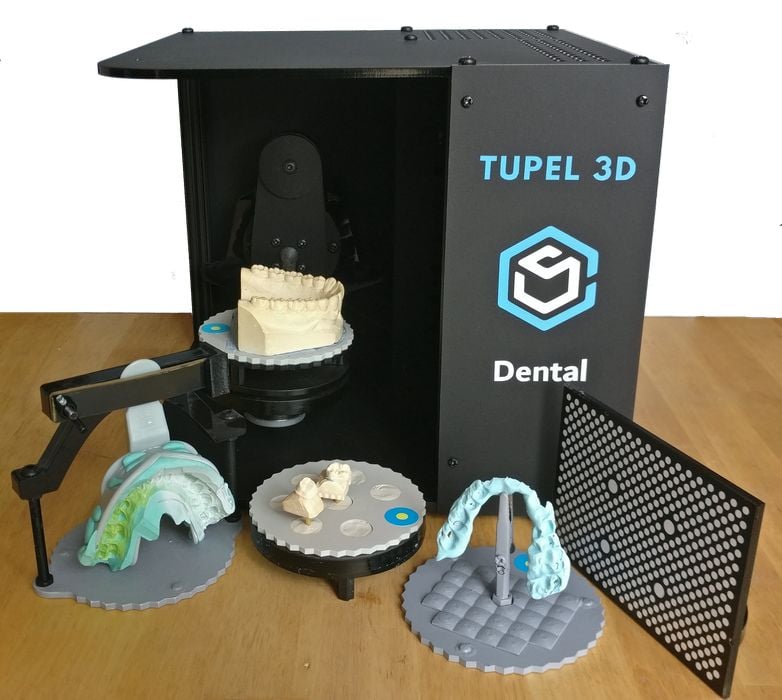
Tupel 3D added a dental 3D scanner to their Kickstarter offering.
The startup company has previously launched a Kickstarter campaign for an incredibly low-priced, high-quality tabletop 3D scanner.
Don’t be confused here: there are many very inexpensive tabletop 3D scanners on the market, and most of them are relatively simple photogrammetry setups, where an object is rotated once for images to be captured. That’s not at all what Tupel 3D does with their 3D scanner.
The Tupel 3D technology involves an advanced form of structured light that uses phase encoding, a technology typically found in medical MRI scanners. This is not your average tabletop 3D scanner.
As of this writing, the Tupel 3D campaign is well past their modest goal of £3,000 — by more than 5X. It seems there is interest for this type of high resolution tabletop 3D scanner.
However, Tupel 3D has now added an additional product to the campaign: a dental 3D scanner.
This type of 3D scanner is used to transform a physical impression obtained from a patient’s teeth into a detailed 3D model. This 3D model can then be used in a variety of ways by dental labs to prepare dental appliances as required.
While the Tupel 3D Dental Scanner is clearly based on the original scanner hardware, there are some differences, mainly in the control software.
For hardware changes, it has special holders designed specifically for dental models, impressions, dies and dentures.
It’s also holds a certification, as it is registered with the US FDA as an official medical device.
For software, the Tupel 3D Dental Scanner’s software can:
- Record patient information,
- Scan models, impressions, and dentures.
- Powerful alignment algorithms to align upper and lower models.
- Scan, align and crop all from one software package
Here we can see the dental scanner in action, and note the particularly useful alignment tool:
Like the original Tupel 3D Scanner, the Tupel 3D Dental scanner has a scanning volume of 120mm diameter by 75mm tall in standard mode, or “super resolution” of 40mm diameter by 40mm tall.
The “super resolution” is a special mode where a resolution of an incredible 0.004mm can be obtained, thanks to the phase encoding technology used in the scanner.
Like the original scanner, the Tupel 3D Dental Scanner carries a low price: £2000 (US$2760), again far lower than you’d expect to pay for alternative commercial dental 3D scanners.
But that low price opens up some new possibilities. In developing countries dental labs may not be able to afford the typical high-priced gear on the market. But with the Tupel 3D Dental Scanner they may be able to acquire high-end function at a very low price.
Tupel 3D’s Founder JF Mather explains:
“Tupel 3D launched new high res scanner as a dental scanner and shipping world wide so now developing countries will be able to do digital dentistry. Digital dentistry includes for example, scanning a patients teeth, designing and making a crown with CAD/CAM tools, then fitting. The digital process is more accurate, more cost effective and saves time.
What’s critical is that the scanner is low cost, and is exports to open standard – i.e. the scans are saved to file types like “STL” that are compatible with most CAD software, and they are not locked to a proprietary format in the same way that HP lock their printers to ink cartridges.”
This is a marvelous development, as the Kickstarter campaign should be available to dental labs in most countries, and Tupel 3D is ready to ship worldwide.
Via Tupel 3D and Kickstarter
